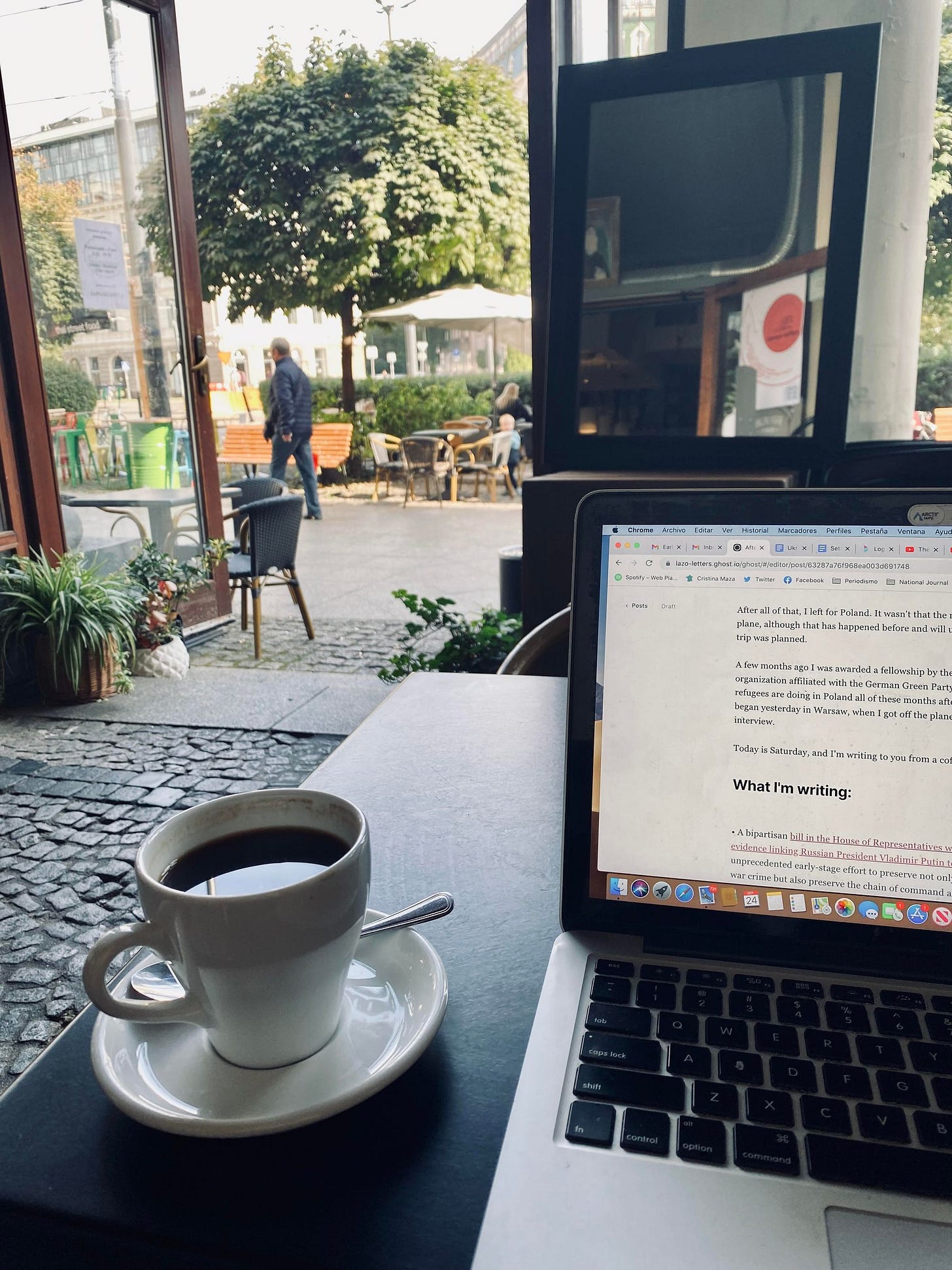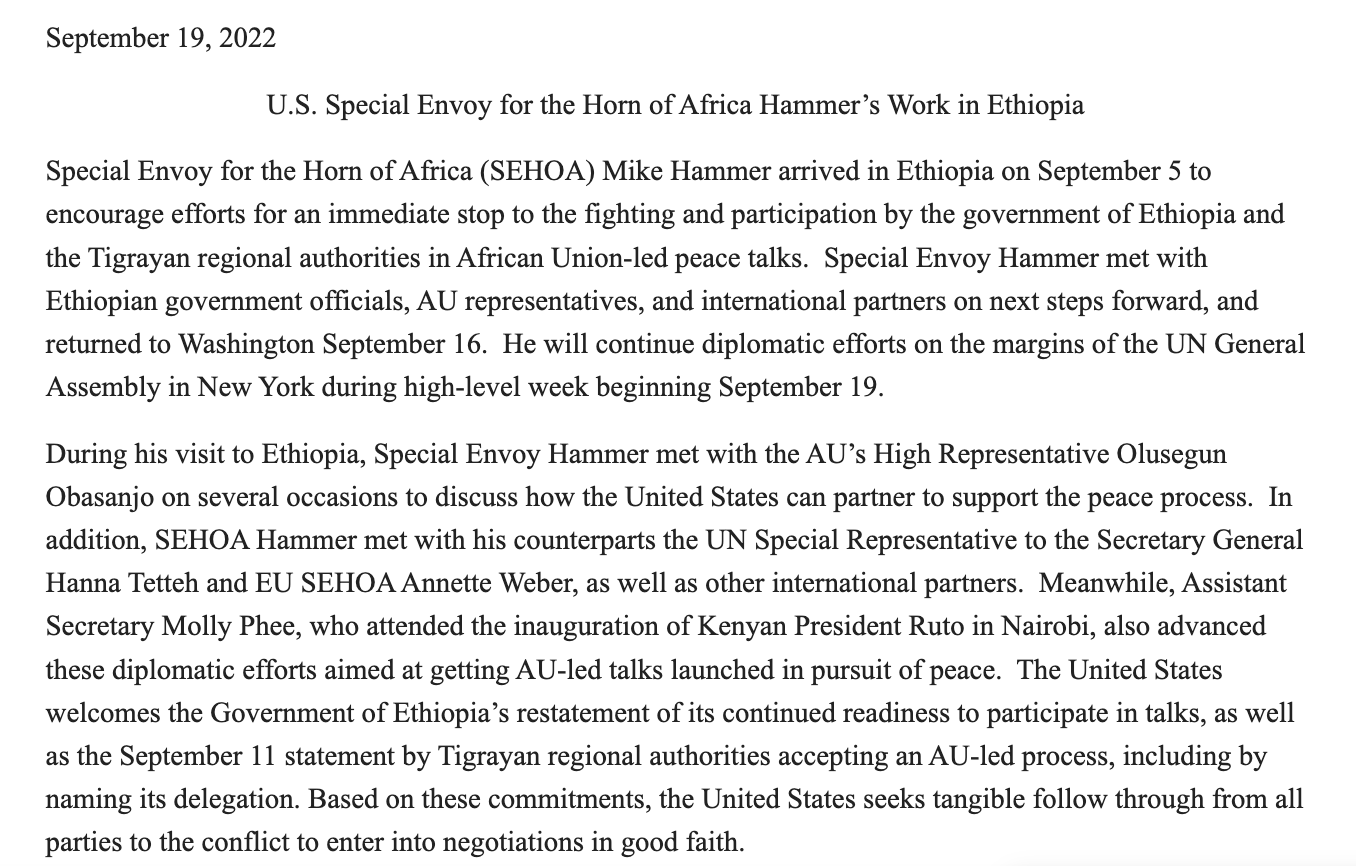After a grim news week, I flew to Poland.
In what appears to be a move of desperation, Russian President Vladimir Putin is ordering a "partial" mobilization of 300,000 reservists as his forces face significant setbacks in their unnecessary invasion of Ukraine. People began fleeing Russia in response, avoiding a war that was, by all accounts, poorly executed. Flights out of the country suddenly got very expensive.
Meanwhile, pro-Russian leaders in occupied parts of Ukraine say they will "vote" to join Russia in a sham referendum. That move comes as Ukrainian troops recapture parts of the occupied Donetsk and Luhansk provinces.
I don't mean to be alarmist, but this could lead to a significant escalation of what was already a brutal war. If parts of Ukraine claim to "join" Russia, it could give the Putin regime a pretense to use tactical nuclear weapons to "defend" their territory from Ukraine's troops, who are making major advances. Or maybe there will be "just" more carnage of the type we have seen already, month after month of fighting in which young men die who shouldn't have.
While all of that was going on, I left for Poland. It wasn't that the news inspired me to jump on a plane, although that has happened before and will undoubtedly happen again at some point in my life. The trip was planned.
A few months ago, I was awarded a fellowship by the Heinrich Böll Foundation, an organization affiliated with the German Green Party, to report on how Ukrainian refugees are doing in Poland all these months after the start of the war. My trip began on Friday in Warsaw when I got off the plane and went straight to my first interview.
Everyone I've spoken to over the past 24 hours said they are worried about events in Ukraine. They're afraid that more refugees will arrive and there will be nowhere to house them. They're concerned about nuclear fallout. They're worried that the war will spread. But for now, everything in Warsaw is peaceful, and there are long lines of people waiting outside the best brunch joints.
By coincidence, I met several Ukrainian refugees yesterday who told me they spent time in Spain after the war began. They didn't like it, and eventually, they opted to return to Poland. In Spain, the war feels very far away, they told me. People didn't understand what they'd been through.
In Poland, on the contrary, people still carry the memory of neighbors invading. Everywhere you look, you see a Ukrainian flag. In the bars, people changed the name of a ginger beer and lime-filled Moscow Mule to a Kyiv Mule. The solidarity is palpable in even the most insignificant moments. The food, the language, and the city streets are all more familiar to a Ukrainian. I tried to imagine what it must be like for someone traumatized by war and invasion to be thrust onto the boisterous, carefree streets of Madrid or any other Spanish city. What a shock that would be. It was a reminder of the vast differences that still exist in the EU, despite nearly two decades of common policies.
Today is Sunday, and I'm writing to you from a coffee shop on Warsaw's Plac Zbawiciela (Savior Square.) I probably won't send a complete edition of this newsletter next week because I'll be on the road and Ukraine's border. But I'll be back with more reporting and insights as soon as possible.
Until then, stay well! You can always write to me at: c.maza@protonmail.com, even if I take a little while to respond.
What I'm writing:
• A bipartisan bill in the House of Representatives would help Ukraine preserve evidence linking Russian President Vladimir Putin to war crimes. “There’s an unprecedented early-stage effort to preserve not only the actual evidence of the war crime but also preserve the chain of command as to who would be responsible going up, which is very, very important,” Congressman Bill Keating told me. This story is unlocked for you to read.
• If you want to hear me talk about Afghan refugees in Texas, we have a new episode on our podcast, National Journal Radio, in which I get into that.
What I'm reading:
Here is a call to protest against mobilization in Russian cities tonight at 7pm. The pun is to call it mogilizatia, from Russian “mogila” - grave https://t.co/U0iBOBMacV
— Nikolaus von Twickel 🇪🇺 (@niktwick) September 21, 2022
• In a major escalation of the war in Ukraine, Russian President Vladimir Putin raised the threat of a nuclear response and ordered 300,000 reservists to mobilize, the Wall Street Journal reports. Without providing evidence, Putin said top NATO officials said it would be acceptable to carry out nuclear strikes on Russia.
• The apparent intensity of mobilization efforts in Buryatia – a Republic in Eastern Siberia – renewed fears that Russia’s ethnic minorities are disproportionately being sent to fight and die in Ukraine, Foreign Policy reports.
• All flights from Russia to neighboring countries sold out on Wednesday as Russians sought to flee a partial mobilization order drafting reservists into the army, according to the Telegraph's Live Blog following Putin's speech. Fears that men of fighting age would not be allowed to leave the country began to spread as the Russian president ordered the call-up.
Protests in Moscow and St Petersburg today have grown pretty large. People chanting “No to War!” Dozens of arrests reported pic.twitter.com/9F4E5VIy9E
— Matthew Luxmoore (@mjluxmoore) September 21, 2022
• Russia was struggling to attract recruits for its army following setbacks in Ukraine, a senior U.S. defense official told the New York Times. “The Russians are performing so poorly that the news from Kharkiv province has inspired many Russian volunteers to refuse combat,” the official said, adding that the leader of the Wagner Group, a private military company with ties to the Kremlin, was seen in videos posted on social media asking Russian prisoners, Tajiks, Belarusians, and Armenians to join the fight in Ukraine.
• Russian military leaders have responded to losses in Ukraine by escalating the air campaign over Syria, Defense One reports.
• Pro-Russian officials in the two self-declared separatist “republics” in eastern Ukraine have called on Moscow to annex the territories immediately, the Washington Post reports.
• Occupied regions of Ukraine announced they would hold referendums on formally joining Russia. Russian-appointed leaders in the occupied regions of Kherson and Zaporizhzhia and the self-declared Luhansk People's Republic and Donetsk People's Republic all said they planned to hold "votes" beginning on September 23, CNN reports. The Washington Post reports that voting in the staged referendums has already started.
my family was just forced to vote at gunpoint in russian cosplay of a “referendum” in southern ukraine:
- they come to your house
- you have to openly tick the box for being annexed by russia (or for staying with ukraine if you feel suicidal)
- all while armed gunmen watch you— максим.еріставі 🇺🇦🏳️🌈 (@maksymeristavi) September 23, 2022
• The United Nations Security Council met to debate how and whether anyone would be held accountable for the war in Ukraine. The meeting was a tense one with insults, accusations, and talk of war crimes and nuclear holocaust dominating the discussions, the New York Times reports.
Russian soldiers have raped and tortured children as young as 4 years old in Ukraine, a UN-appointed panel of independent legal experts said in a damning statement on Friday that concluded war crimes had been committed in the conflict. https://t.co/6OMpCJjmtQ pic.twitter.com/nQBTAuTmya
— The New York Times (@nytimes) September 23, 2022
• House Speaker Nancy Pelosi became the highest-ranking U.S. official to visit Armenia since its independence from the Soviet Union in 1991, Politico Europe reports. During the visit, Pelosi denounced “illegal and deadly attacks by Azerbaijan.”
• Thousands of protesters denouncing high inflation and fuel prices massed outside Moldova's government, demanding the resignation of pro-Western President Maia Sandu and her government, Reuters reports.
• Police clashed with right-wing protesters as several thousand people joined an LGBTQ march in Serbia for the end of EuroPride week, Reuters reports. Threats from the Orthodox Church, the far-right, and Serbia’s president did not stop thousands of people from marching.
• Serbian President Aleksandar Vučić, who first banned the march but then caved due to pressure, called the parade a “hybrid war” against Serbia, Politico Europe reports.
• If you want a completely different take on the Bulgaria-North Macedonia dispute from the one we featured here, you can read Katerina Kolozova's op-ed for Al Jazeera. She argues that the so-called "French Proposal" isn't as bad as everyone says.
• The European Union recommended suspending some 7.5 billion euros in funding for Hungary over corruption, the first such case in the 27-nation bloc under a new sanction meant to better protect the rule of law, Al Jazeera reports.
• But the EU executive also opened the door for a compromise that would allow Hungary to get the cash if it addresses EU concerns about corruption, Politico Europe reports. The Commission also only proposed cuts to cohesion funds, even though most of the EU’s transfers to Budapest are agricultural subsidies.
• Voting begins in Italy today. Italy’s national election on Sunday will likely bring to power parties with historically friendly ties to the Kremlin, Al Jazeera reports.
• The family of the slane journalist Shireen Abu Akleh submitted a complaint to the International Criminal Court (ICC) with evidence that Israeli forces deliberately killed the reporter, the Guardian reports.
• Israeli Prime Minister Yair Lapid told the United Nations that he supports the creation of a Palestinian state alongside his country, the Wall Street Journal reports.
• Turkey has become the first NATO country to seek membership in the China-led Shanghai Cooperation Organization as President Recep Tayyip Erdogan attempts to forge alliances with countries in the East, Bloomberg reports.
• Protests spread across Iran over the death of a young woman in police custody who allegedly violated the country’s strict Islamic dress code, the Wall Street Journal reports.
The scenes in Iran are astonishing. How far will these protests go?
pic.twitter.com/AJeHB0yyYB— Frida Ghitis (@FridaGhitis) September 20, 2022
• The Haitian government’s plan to raise fuel prices sparked chaos in the Caribbean country, with thousands of protestors taking to the streets to call for the prime minister’s overthrow, the Wall Street Journal reports.
• The Extraordinary Chambers in the Courts of Cambodia - a UN-backed tribunal charged with prosecuting the crimes of the Khmer Rouge regime - held its final hearing, the New York Times reports. The court rejected an appeal by 91-year-old Khieu Samphan, the Khmer Rouge's last surviving leader, upholding his life sentence for genocide.
• South Korean President Yoon Suk-yeol was caught on a hot mic calling U.S. Congress members “idiots," the Washington Post reports.
hey, only we get to say that https://t.co/aMhRfCpJGF
— Rep. Peter Meijer (@RepMeijer) September 22, 2022
• The Wall Street Journal reminds us that Thomas Barrack, a confidant of former President Trump, goes on trial this week on charges that he illegally pushed U.S. officials to support policies favoring the United Arab Emirates.
What the State Department says:
You can write to me for any reason: c.maza@nationaljournal.com.








